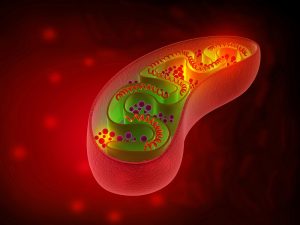
And there are also mitochondria.
Mitochondria are organelles that are found in every cell in your body, providing the energy they need to function properly. They are known as “batteries” or the “powerhouses of cells,” and when they deplete, functionality decreases.
Age has a known impact on mitochondria levels. As a person gets older, their mitochondria deplete. It could be why your skin wrinkles, your organs don’t function as efficiently, you feel more fatigued, or you become more prone to disease.
But it’s possible that certain foods and behaviors can bolster mitochondria to keep levels up as you get older. Diet and exercise, for example, are associated with higher mitochondria counts.
Take melatonin, for example. The popular sleep hormone may also play a role in manufacturing melatonin, and some research suggests that melatonin may help maintain mitochondrial function.
You can get more melatonin in your diet from pistachios, olive oil, and red wine (all Mediterranean diet components).
Antioxidants like Coenzyme Q10, or CoQ10, also play a key role in mitochondria function. CoQ10 is generally recognized as the main antioxidant cells provide to protect and support mitochondria,
CoQ10 can be found in animal meats, fatty fish, spinach, broccoli, and cauliflower, fruits like oranges and strawberries, and legumes like lentils and peanuts.
Mitochondria, like your other organs and tissue, do better when you treat them right. So instead of focusing primarily on what you can do to keep your mitochondria numerous and efficient, look at the bigger picture.
For example, a healthy diet and an active lifestyle don’t just boost mitochondria; they are likely to offer overall health benefits. The effect on mitochondria is only part of the story.